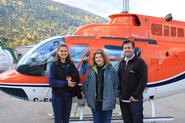
Over fall break, a group of researchers from Hamilton College embarked on a research trip to the Slocan Valley, containing one of the few undammed rivers in the Upper Columbia River Basin of Canada’s British Columbia province. The purpose of their trip was to film interviews with local people regarding the presence of aboriginal people in the valley.
The team consisted of Assistant Professor of Anthropology Nathan Goodale, Erica Kowsz ’11, Susannah Wales ’13, Associate Director of Instructional Technology Support Services Janet Simons, Academic Office Assistant Alissa Nauman and Assistant Professor of Anthropology Leora Bar-el of the University of Montana.
In 1956, the Arrow Lakes Band, indigenous to the Upper Columbia River Drainage was pronounced extinct under the Indian Act imposed by the Canadian government despite the survival of tribal members on reservations in the United States. Today, the Lakes people known now by their traditional name, the Sinixt Nation, have been making their presence more visible in the northern reaches of their ancestral territory in Canada to preserve the remaining cultural and natural resources of the region.
Despite the lack of current recognition, ethnographic records establish a Sinixt presence in the valley during historic times. Archaeological excavations in the Sinixt ancestral territory over the past decades have provided evidence of continuous occupation for the past 3000 years. The Sinixt Nation is currently litigating to be recognized as an aboriginal people of Canada.
Goodale has been working closely with the Sinixt Nation since 2000 conducting archaeological research in their ancestral territory. In the summer of 2009, he ran the first Hamilton College archaeological field school in the region, which Kowsz attended. That experience developed into Kowsz’s senior research project, an interdisciplinary attempt to relate the existing ethnographic and historical sources on the Sinixt people to the archaeological record of the northern territory from which they were displaced.
By researching this relationship Kowsz hopes to explore the viability of projecting Sinixt cultural identity into the past. On a theoretical level the project explore the relationship between ethnographic sources and the past through exploration of how group identity manifests in the archaeological record and the significance it holds for descendant populations.
The interviews conducted in October explore the complex relationship between the archaeology of the area and the ethnography, history and contemporary situation in the valley. The footage will be an essential part of Kowsz’s senior project and documentary film to be produced this spring. She will present her research in a poster session themed around Cultural Heritage and Site Preservation at the Society for American Archaeology annual meeting in April.
Kowsz said that the trip was at the heart of her project. “Without this trip, I wouldn’t have been able to complete the project I’m doing, not just the documentary film, but also the written work. Getting out there and talking to people was the only way to really understand a complex situation.” Her work in the Slocan Valley ties into her Levitt Grant research from the summer of the 2009, which also dealt with oral history, cultural conservation and construction of narratives of the past, but in the context of rural coastal Ireland rather than the Interior Northwest.
The team was able to complete this project with the support of the Digital Humanities initiative and the Dean of Faculty. Goodale will continue to work on this project in the coming years, continuing to collect video footage and excavate at the biannual Hamilton College Field School.
Details about the field school, which will run next summer, will be available in the spring semester for students interested in participating. Goodale will announce an informational meeting in early February.
Posted November 29, 2010
